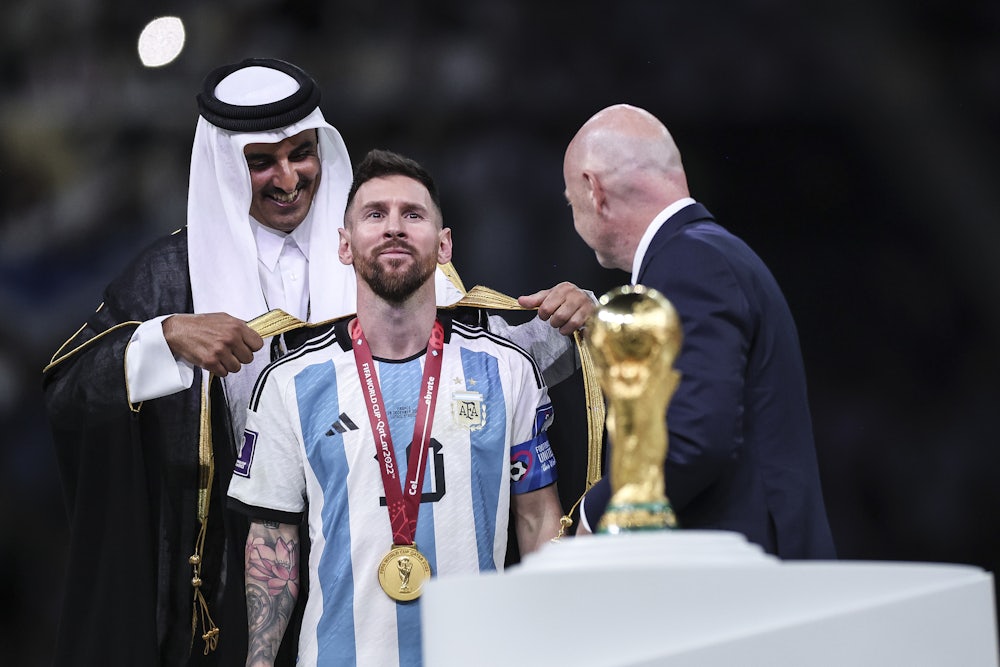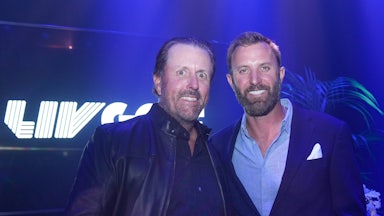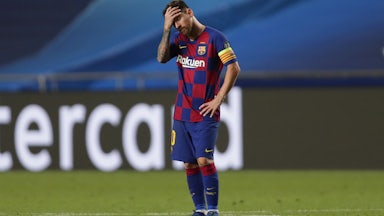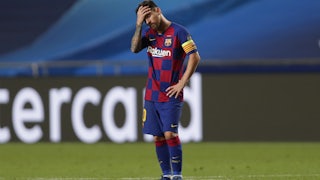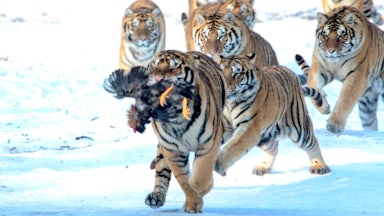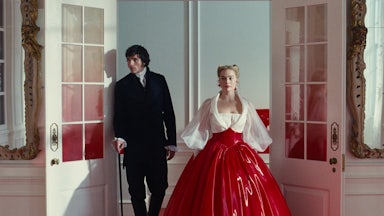“En Argentina nací, tierra de Diego y Lionel.” These words echoed through stadiums across Qatar whenever Argentina won—and it won plenty. “I was born in Argentina, the land of Diego and Lionel,” the chant begins, before launching into a catalogue of heartbreaks and tragedies—losing in the World Cup finals in 1990 and 2014; the shocking death of Diego Maradona in 2020 at just 60—culminating in the team’s triumph over Brazil at the 2021 Copa América.
“Muchachos, ahora nos volvimos a ilusionar quiero ganar la tercera, quiero ser campeón mundial y al Diego, en el cielo lo podemos ver con don Diego y con la Tota, alentándolo a Lionel,” it ends. “Boys, now we’re dreaming again. I want to win the third; I want to be world champion. And we can see Diego in heaven, watching with his mother, cheering on Lionel.” It’s a lovely song, evolving from La Mosca Tsé-Tsé’s, “Muchachos, Esta Noche Me Emborracho” (which translates, exquisitely, to “Boys, Tonight I’ll Get Drunk”) into a song that perfectly captures the mood of one of our greatest soccer cultures. There is grace and beauty in Argentinian soccer, but also trauma and heartbreak; success, when it comes, is almost always hard won.
For Messi, it’s a coronation and a culmination. For most of his career, he was regarded with skepticism by many Argentinians. He wasn’t Maradona; as someone who left for Barcelona when he was more or less the size of Flat Stanley, he was barely Argentinian. Now, in the wake of Maradona’s death and the Copa América victory, the country and its talisman have finally embraced each other.
It should be a triumph in another way as well. Argentina currently has the best bid for the 2030 World Cup, which it’s sharing with neighbors Uruguay, Chile, and Paraguay. The symmetry is perfect: 100 years ago, the first World Cup was played in the frigid mountains of Uruguay. Now, a century later, football could—with apologies to England, which also has a bid out—finally come home.
There’s one problem: Messi is actively undermining that bid. In May, Saudi Arabia announced that the diminutive forward had become a “cultural ambassador” loosely tied to the country’s Blade Runner–esque “Vision 2030” plan. Although not officially part of the Gulf nation’s World Cup bid, he is clearly only involved for that reason and he’s reportedly being paid as much as 25 million pounds per year for his services. It adds considerable taint to Messi’s triumphant run in the World Cup. When all is said and done, Messi will go back to play for Paris St. Germain, the Qatari-owned team he plays for, and shill for a murderous regime.
Messi’s PR work for Mohammed bin Salman has received relatively scant attention. One big reason why is that he is back to playing some beautiful soccer after spending much of last year glowering in Paris. But the more banal and depressing reason is just that we’ve come to expect this kind of cynicism in international sports. Twelve years ago, when Russia and Qatar were awarded the 2018 and 2022 World Cups, respectively, the term “sportswashing”—the means by which brutal, authoritarian regimes use sporting events and teams to launder their reputations—didn’t exist. It’s not that the two aforementioned nations invented this practice—for examples, look no further than the Munich Olympics or, for that matter, the 1978 World Cup, which was hosted by Argentina’s brutal military dictatorship. We have simply arrived in the golden age of sportswashing. But we may finally be at a turning point: Having just emerged out of a World Cup hosted by a restrictive, anti-democratic country that heavily relied on exploitative migrant labor, there are signs that the world is waking up to the dangers of letting authoritarian countries take over global sports.
If nothing else, 2022 has shown how important the practice of sportswashing is to corrupt regimes—and how it’s become a “one neat trick” to launder their tawdry reputations. In the fall of 2021, Saudi Arabia officially completed its takeover of the English Premier League club Newcastle United, joining Qatar (France’s Paris St. Germain, bought in 2011) and the United Arab Emirates (Manchester City, bought in 2009) in global soccer’s ownership class. (Officially and absurdly, the team is owned by Saudi Arabia’s Public Investment Fund, and not the state itself and its ruthless head, Mohammed bin Salman.) That takeover was greeted with both protest (from many soccer fans and human rights groups) and glee (from Newcastle United fans who were sick of the team’s thorough and long-standing commitment to mediocrity); for much of the early autumn, it led to hundreds of columns and hours of media coverage, even occasionally breaking through on the television networks that broadcast the EPL and are often allergic to covering politics or anything more controversial than Pep Guardiola’s lineup decisions in big games.
But by the start of 2022, it was clear that the gambit had worked. Media coverage of the team’s connection to Saudi Arabia slowed to a trickle, then dried up altogether. As the team began spending its newfound millions to acquire better players, the coverage of the team took on a transcendent glow. Now, Newcastle United is not only ascended from the subpar depths in which it was long mired, it is one of the Premier League’s best teams—and by extension, one of its best stories. Led by a brilliant young manager and a bevy of solid veterans (Kiernan Trippier, Chris Wood) and rising stars drawn to a rich club on the rise (Bruno Guimarães, Alexander Isak), the team is dramatically outperforming expectations. Naturally, some of that comes down to coaching. But much of it comes from something rarely mentioned in media coverage: The Saudi money underpinning the team, which has allowed Newcastle to become a bigger fish in the wild seas of the transfer market.
The Qatar World Cup has been less of a rosy story. But it too demonstrates that authoritarian countries can often simply wait out negative coverage. In the lead-up to the tournament, the Qatari hosts were clearly rattled by the sheer number of stories documenting the deaths of thousands of migrant workers, as well as the country’s horrific record on human rights for women and LGBTQ people and its general aversion to democracy and basic freedoms. But as one might expect, once the games kicked off, negative coverage of Qatar slowed to a trickle, taking a back seat to the tournament’s exceptional play and moving storylines—Morocco, Messi, Japan, Dutch manager Louis Van Gaal, the list goes on and on. All Qatar really had to do was wait for the eye of the global sports media to focus on the matches, not the wealth and human rights abuses that enabled them.
No one figure has better exemplified the rise of sportswashing as well as Roman Abramovich, the Russian oligarch who became the embodiment of international soccer’s growing immorality and its all-encompassing commitment to money above all other concerns after he purchased Chelsea Football Club in 2003. Abramovich splashed billions in a sport where making money is often quite difficult, and he got results: five Premier League titles, two Champions League trophies, and, most recently, a Club World Cup, which is mostly fake but still sounds cool.
Abramovich’s wealth quickly distorted the sports haves and have-nots: Legacy teams like Barcelona have had to spend more, often going deeply into debt, to keep up. But he also served as a vital conduit between Russia and the West; he was arguably the highest profile oligarch in London and helped open channels between his home country and English and European cultural and political organizations. His connections served another vital interest: In 2010, he helped swing FIFA’s voters—in an election whose corruption nearly brought down the organization—to give Russia the 2018 World Cup.
Abramovich’s reign ended earlier this year, after he was forced to give up the team in the wake of Russia’s invasion of Ukraine. That was, as I wrote at the time, a big step for soccer, one that feels of a piece to the moral outrage and incisive coverage in the lead-up to Qatar’s World Cup. But by the time Abramovich was forced to give up his favorite toy, he and Russia had gotten what they wanted out of Chelsea: Years of good press, the 2018 World Cup, a wheelbarrow full of trophies, and an enhancement of Putin’s soft power. Who’s to say if Saudi Arabia and the United Arab Emirates would have lost their standing in the international sports world if they’d invaded Qatar, something that was close to happening only four years ago. Would the United Kingdom force Saudi’s Public Investment Fund out of the Premier League if a British journalist was killed by state actors in the way that Saudi-American journalist Jamal Khashoggi was? I have my doubts.
Still, even though the rose-colored lens returned to coverage of the Qatar World Cup as the matches got underway, it really feels as if scrutiny of the practice of sportswashing is becoming a growing concern and that the host nations of big sporting events such as the World Cup or Olympics will face tougher questions. One should certainly expect global critical coverage of gun culture in the United States in the lead-up to the North American 2026 World Cup. And in 2028, when the Olympics return to Los Angeles, you can expect a bright light to be shone on the housing displacement and cost overruns that have become associated with the Summer Games.
There’s a certain irony to the World Cup falling into the hands of a despotic regime. Qatar wanted the World Cup to bolster its global reputation and allow it to hobnob on the world stage with potential allies and partners. (This is not just out of a desire to enhance their global standing—Qatar is a very small country that was, as mentioned above, nearly invaded by its neighbors very recently.) It achieved some of these goals. But it couldn’t quite sweep the grotesqueries under the rug. The media illuminated the Qataris abysmal treatment of migrant workers and many other people who live within its borders. It’s primed the pump for more of this kind of coverage in the future. Any country looking to host a global tournament will have to expect harsher scrutiny now. That may not alter the big picture as quick as one might hope: Global sports leagues will still do business with just about anyone, so long as the check clears; Saudi Arabia may very well host the 2030 World Cup. But sports fans have woken up to the evils of sportswashing, and the media has learned that there are plenty of these kinds of stories to cover—and an audience that’s eager to hear them.
